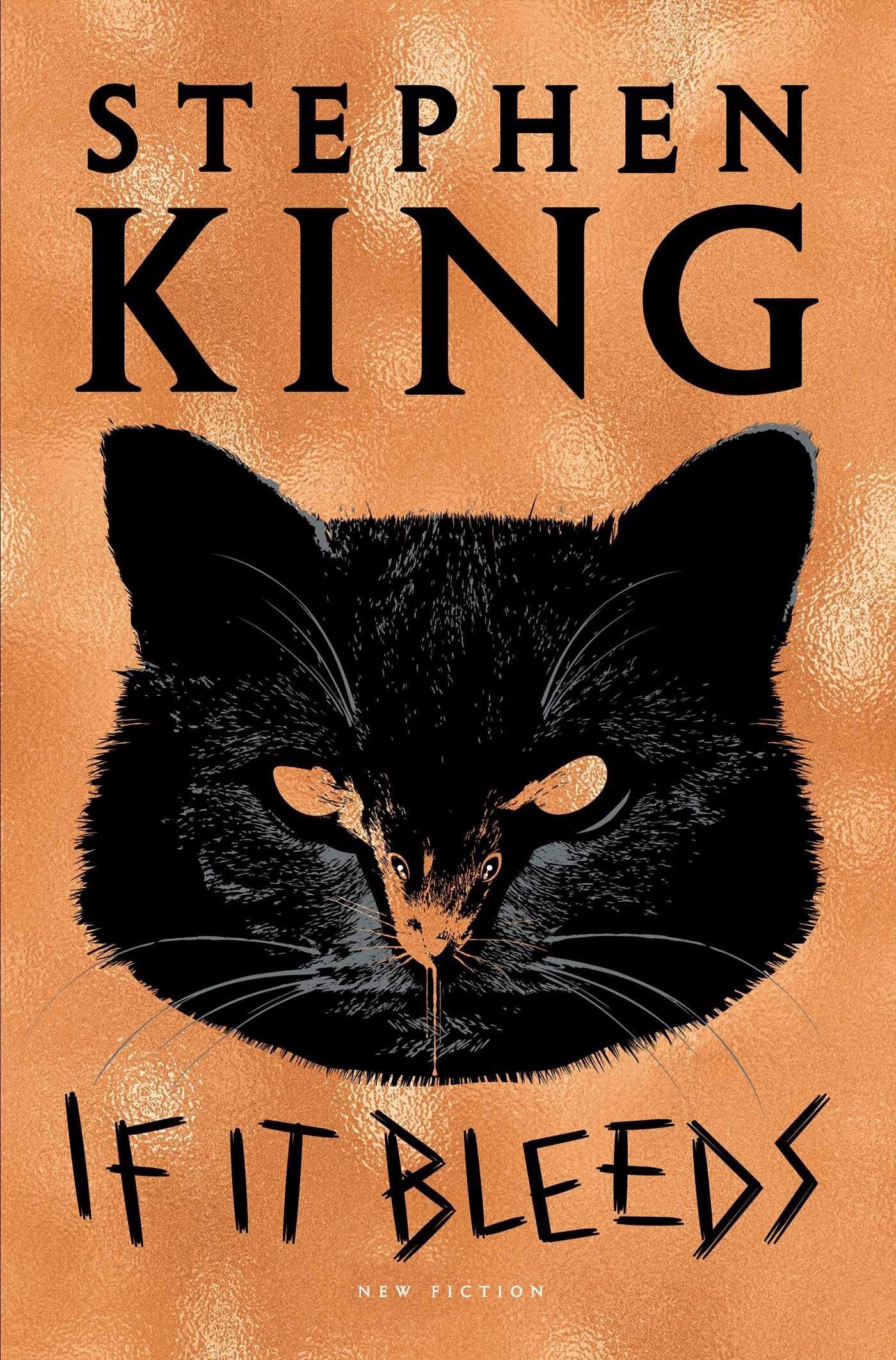Book Review — "If It Bleeds" by Stephen King
Does anyone else read “Dear Constant Reader” and feel like they are being addressed directly? Because I do.
I’ve been reading Stephen King since I was 12 years old, and yet this is my first time writing a review of his work. The man is without a doubt the artist who has shaped my life the most, as the person to blame for my love of horror. King was not my introduction to the genre, but he certainly solidified my obsession with it. So when I set out to read his newest book, I knew that I had to write about it, whether I liked it or not. And given that my adoration is not an allegiance—there are a few King books that I did not enjoy at all—I was nervous that this would have to be a negative critique. And thankfully, If It Bleeds is a book that I admire quite a bit!
If It Bleeds is a collection of four novellas—the literary form that is sneakily dethroning the short story to become my favorite type of prose fiction. I’ve read several of King’s short story collections, and it looks like I’m going to have to go back and finally read his novella collections, too. Actually, I can’t believe I haven’t consumed them by now, considering they’re the source material for some of King’s best film adaptations: The Shawshank Redemption, Apt Pupil, Stand By Me, Hearts in Atlantis, and The Mist, etc.
Prior to this one, Full Dark, No Stars was the only other grouping of King novellas that I’d read. Like that one, If It Bleeds contains four stories that are wildly different from one another, and yet each in its own way perfectly exemplifies what makes Stephen King one of the greatest writers of all time.
The first of my two favorites is the opening story, “Mr. Hannigan’s Phone.” It’s fantastic proof that horror does not need to be “scary” in order to be horror, although it has its creepy moments. It’s a good, old fashioned eerie tale with a lot of warmth. In it, a young boy named Craig loses someone dear to him, the titular Mr. Harrigan, a wealthy old man who spent the majority of his life as a Luddite. Before Mr. Harrigan’s death, Craig had introduced him to the wonders of having a smartphone—getting breaking news, weather forecast updates, and stock index changes in real time. So when Mr. Harrigan dies, Craig slips the device into the casket, as an emblematic gesture. And so Craig can “call” him, for comfort. But, over time, Craig realizes to his amazement that not only does the phone seem to receive a signal whilst six feet under, but its battery won’t die… One day, troubled and in a fragile state, Craig confides in a voicemail who’s making his adolescent life hellish, and, well, mysterious things start to happen to those folks.
“Mr. Harrigan’s Phone” hit me in a weird place. My situation with my father is somewhat fraught, or at the very least enervating. When he exited my life for the first time, he left behind a cell phone. And for some weird reason, I used to keep it charged. I didn’t want it to die because… symbolism. This bittersweet novella reminded me of that time. I would’ve been fifteen. So when teenage Craig would call Mr. Harrigan’s phone and listen to the old man’s voicemail greeting for a form of connection, I got it. And when an otherworldly presence begins to respond to Craig’s grief, I got goosebumps. But even though I became slightly unsettled at points, there’s a tenderness at the core that prevents this ghost story from being overly chilly. It’d be a perfect set-up for an episode of a Night Gallery-like anthology series by way of Richard Matheson. Or better yet, the Jonathan Frakes-hosted Beyond Belief: Fact or Fiction.
My other favorite novella, the closer, is more akin to Tales from the Crypt. First of all, I related to the protagonist of “Rat” a little too much for my liking. Drew Larson is a writer who seldom writes to completion. Over the course of a couple decades, Drew has only published a handful of short stories. They appeared in some of the most prestigious literary journals in the world, sure, but he’s far from prolific. And he can’t seem to finish a novel. Now, an author does not need to birth a novel in order to be legitimate. But it matters to Drew. Unfortunately, his every attempt ends with a severe mental breakdown… Determined to finally crack the code, Drew sojourns by his self to his late father’s secluded cabin in the woods of northern Maine—what could go possibly wrong?
“Rat” is perhaps the most uncanny entry, so I’ve got good news for Constant Readers who long for 70s/80s era King. This one definitely has that old school energy, which might explain why I devoured it the fastest. The tension builds incrementally toward what at first feels like a one-man retread of The Shining, but then it turns into something more akin to a Night Shift or Skeleton Crew piece. Here’s a confession for you: I tend to roll me eyes when a writer writes about a writer writing. But King seems to be the only author who truly and consistently captures the uneasiness of wordsmithing and makes it feel fresh. Drew’s anxieties ring so true as his desperation mounts in isolation—and when he refuses to flee the cabin as a known danger nears. I thought I knew the dark note King would end this story on, but I was wrong. It goes out in a much gloomier way, and I (an infamous Gloomy Gus) loved it.
Although I’d say that “Mr. Harrigan’s Phone” and “Rat” are my favorite If It Bleeds stories, the other two are also solid. “The Life of Chuck” is a story that I’m sure I will grow to adore more on my eventual re-read. Because on paper, to put it simply, it is technically brilliant. It’s structured impressively well. This is the kind of story that would likely be accepted by those same literary periodicals that Drew Larson’s fiction got into. In fact, if someone other than Stephen King wrote it, it’d go on to be included in an edition of Best American Short Stories. Because “The Life of Chuck” is the book’s most meticulous, cerebral entry; it demands the most from its readers, intellectually. So I should love it, and I bet I will one day. I’m just not vibing with it right now…
Here’s the thing about “If It Bleeds,” the titular novella. I have mixed feelings about Holly Gibney. I know, I know… I’m aware that those words are damn near sacrilegious among a certain faction of Constant Readers. Don’t get me wrong, I don’t dislike Holly by any means. I’m just not head over heels for her. In the Bill Hodges trilogy, she was just a bit too quirky for me, almost like King was trying too hard to make her the kind of loveably eccentric detective that we’re used to seeing on TV. But I will admit that she’s growing on me.
Reading The Outsider and the Bill Hodges novels are not necessarily prerequisites to understanding the goings-on within “If It Bleeds,” but the villain of the story is a continuation of sorts from The Outsider and characters from the Bill Hodges series pop up, so a passing familiarity with those properties would help. Even if I’m not her #1 fan, it’s still nice seeing Holly Gibney take center stage—and if King decided to give Holly her own series, I’d read every one, whether the previous adventure was enjoyable or not. Like I told you, my feelings are mixed. I wouldn’t be surprised if King had intended for this to be part of Hard Case Crime, the noir enthusiasts who brought us The Colorado Kid and Joyland. This story is probably a smidge too supernatural for that venue, but it’d be a cool as hell way to move forward with the spunky investigator.
Overall, If It Bleeds has something for everyone. It puts each of the author’s strengths on full display. You’ve got an intimate character story with just a dash of spooky stuff, an intriguing and touching literary endeavor whose vigor lies in its brainy construction, a spirited follow-up to a recent novel that revives some fan-fave names, and a callback to the Faustian style of horror that made King a bestseller in the first place. Each tale is told deftly. And with a masterful flourish. I want King to keep writing shorties forever.
Because—maybe this is controversial, but—I think these days I prefer Stephen King’s shorter fiction…




